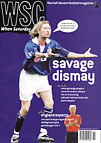 Jan Lotze takes issue with the webs leading purveyor of exclusive nonsense about top players, which it is keen to keep a firm grip on
Jan Lotze takes issue with the webs leading purveyor of exclusive nonsense about top players, which it is keen to keep a firm grip on
First came the internet, with unlimited free access to all the information that was on it. Then came people who thought that the internet would be a good way to make themselves some money, which was inevitable. Then came people who wanted to have their cake and eat it, like icons.com.
Icons.com set up itself up as a core site to host professional footballers’ official homepages, so that these busy men would not have to do any web-work besides writing an occasional column and signing some shirts to flog at twice their usual retail price. Some players started breaking news via these columns and, shock horror, the sports media reported and reprinted the things they were saying. And what did icons.com get out of that? Not a penny! Just imagine.
In order to log on to icons.com and read those exciting player diaries (where, according to Ryan Giggs, he lets you know what’s really happening at the world’s greatest club) you now have to register first. This is a straightforward task, but when you do this you are agreeing to the terms of the icons.com statement, which says: “You are not permitted to copy, download, store (including in any other website), distribute, transmit, broadcast, adapt or change in any way the content of these web pages for any other purpose without Icons Worldwide’s prior written permission.”
Aside from the authoritarian pomposity of such a statement, with its echoes of the Football League’s ridiculous claim of copyright over its fixtures list, this raises an interesting question for journalists. Imagine you are a sports hack on a national daily just about to go to press. Ryan Giggs announces exclusively on icons.com that he is about to complete a £30 million move to Juventus, but neither club will confirm or deny. Do you wait for icons. com to give you permission to print the news and risk missing your deadline, or do you go ahead and publish with the risk of being sued? Or, put another way, would you still want to have a job the next day?
The internet is awash with rumour and calumny, which is part of its attraction. Icons’ obnoxious possessiveness over its mostly banal content (“It’s fair to say we have given ourselves a great chance of going through after winning 5-0 in Finland a fortnight ago” – Robbie Fowler) is an unwelcome contravention of the worldwide web’s founding spirit. By all means, be greedy and charge £99.49 for a signed replica shirt. No one is forced to buy such rubbish. But don’t start telling people what they can or can’t do with information you have chosen to put in the public domain to a worldwide audience. Especially when you’re usually purveying little beyond the fact that player A is gutted over club B’s latest bitterly disappointing result.
Exclusive, my arse.
Reviews
Former Southampton player Ivan Golac is now running a chocolate factory in Belgrade. Ex-Ipswich Bulgarian Bontcho Guentchev is the proprietor of a coffee shop in West Kensington. Peter Knowles, the erstwhile Wolverhampton Wanderer who quit the game in 1971 to become a Jehovah’s Witness, is still knocking on doors, at least when he’s not cleaning windows. And former Welsh goalie Dai Davies runs a natural healing centre in Llangollen.
All supremely important information gleaned from askgreaves.com, the website produced by the men who wrote the uselessly fascinating Where Are They Now? books. It features the updated contents of those books, although you have to plough through a host of sports shop owners, non-league coaches, after-dinner speakers and Sky TV pundits (who seem to have spawned like bacteria over the past few years) to find the more interesting professions cited above.
The ex-Scotland striker Alan Brazil is listed as having lost his pub in Ipswich due to debt, but mentions that he took up a post at the radio station Talksport. It doesn’t mention, however, that he took some man-at-the-bar opinions along with him, and that with co-host Mike Parry he has been spewing noxious verbals on sensitive subjects such as immigration and asylum seekers on their morning show.
The site Supporters Against Alan Brazil seeks to redress the balance, although it largely fails due to lack of content and almost falling to the level of its inspiration in the messageboard and guest book sections. It doesn’t appear to have been updated for a while, but should be revived and resuscitated in the light of Brazil’s most recent tactless tirades.
Far more worthy is Football Culture, a joint venture produced by the British Council and the BBC aimed at exploring the culture of football globally, and at promoting informed debate about the cultural significance of football. While this is undebatably a noble goal, many of the general football pieces are targeted at a wide, non-English speaking audience, and can read at times as if written for a very young readership. An unkind critic might even call them bland.
However, there are compensations. For example, Simon Inglis’s pieces in the football art section embrace interviews with football playwright Clifford Oliver, who has written plays about the racism in the game facing aspirant Asians in the UK; Bradford photographer Ian Beesley, who only photographs the crowd and not the game; and artist Laura Green, who prefers painting football stadiums to bowls
of fruit.
At Old Trafford, for example, she wrapped herself in a huge sheet of transparent acetate. With a felt-tip pen she then traced the outline of the stadium on the acetate, as if immersing herself in a giant fish-eye lens. And she still made more noise than the home fans. Ian Plenderleith
From WSC 177 November 2001. What was happening this month